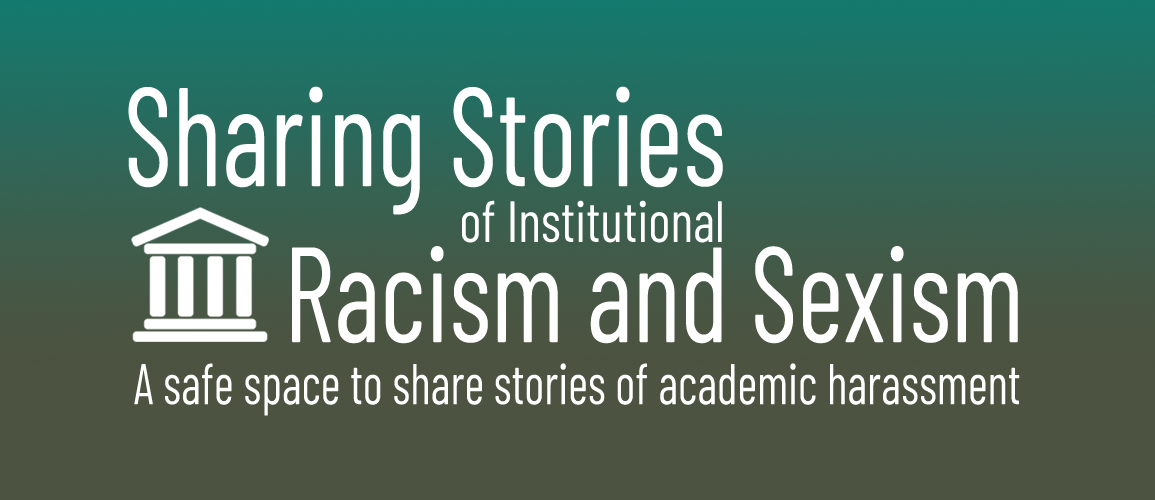What is academic harassment?
According to a report on harassment in Dutch academia, academic harassment is “an overarching term for all behaviour that obstructs scholars in their academic work and their career progress.” The authors pointed out this can both be “immediately task-related (such as exclusion from research and teaching projects, or senior academics claiming co-authorship of junior’s publications), or more person-centred (such as exclusion from informal networks).” [Cited from the LNVH (Naezer, M., et al. , 2019)
For the complete report: LNVH rapport: Harassment in Dutch academia – Exploring manifestations, facilitating factors, effects and solutions
Implicit bias is one source of academic exclusion, and SSIRS wants to bring these implicit assumptions, as well as the more explicit discrimination into the public eye. It is no longer acceptable to turn away from the problem and pretend it does not exist.
What is institutional sexism in the academy?
Academic sexism takes place daily in many classrooms, centers, institutes, research groups, and laboratories. Womxn and minorities are especially, if not exclusively, targeted. Academic sexism can take various forms, ranging from an inappropriate compliment to a student, a sexist joke or a confirmation of a gender stereotype in a course, a question about the potential to have children to a candidate for a job interview, or favoritism in the appointment of a candidate as well as more extreme forms like sexual assault and harassment.
What is institutional racism in the academy?
Academic racism is found in the classroom and workspace, but is also embedded in unfair policies, discriminatory treatments, and hiring and evaluation practices based on race that result in unjust outcomes for people of color and/or ethnic/religious minorities. These extend considerably beyond prejudice. Often, these institutional policies and practices do not mention race or racism, but result in unfair treatment and an underrepresentation of scholars in the academy that are not white.
Resources on Institutional/Academic Sexism and Racism
Websites/Blogs
Academic Publications
Esnard, Talia, and Deirdre Cobb-Roberts. 2018. Black Women, Academe, and the Tenure Process in the United States and the Caribbean. Palgrave Macmillan.
Johansson, Marjana, and Martyna Śliwa. 2014. “Gender, Foreignness and Academia: An Intersectional Analysis of the Experiences of Foreign Women Academics in UK Business Schools: Gender, Foreignness and Academia.” Gender, Work & Organization 21 (1): 18–36. https://doi.org/10.1111/gwao.12009.
Mayock, Ellen. 2016. Gender Shrapnel in the Academic Workplace. New York: Palgrave Macmillan.
Mifsud, Denise. 2019. “Introduction: The Positioning and Making of Female Academics – A Review of the Literature.” In The Positioning and Making of Female Professors, edited by Rowena Murray and Denise Mifsud. Switzerland: Palgrave Macmillan.
Taylor, Yvette, and Kinneret Lahad, eds. 2018. Feeling Academic in the Neoliberal University. Feminist Flights, Fights and Failures. Cham, Switzerland: Palgrave Macmillan.
Thwaites, Rachel, and Amy Pressland. 2017. Being an Early Career Feminist Academic. London: Palgrave Macmillan.
Turner, Caroline Sotello Viernes. 2002. “Women of Color in Academe: Living with Multiple Marginality.” The Journal of Higher Education 73 (1): 74–93. https://doi.org/10.1080/00221546.2002.11777131.
Turner, Caroline Sotello Viernes, Juan Carlos González, and J. Luke Wood. 2008. “Faculty of Color in Academe: What 20 Years of Literature Tells Us.” Journal of Diversity in Higher Education 1 (3): 139–68. https://doi.org/10.1037/a0012837.
Turner, Caroline Sotello Viernes, Samuel L. Myers, and John W. Creswell. 1999. “Exploring Underrepresentation: The Case of Faculty of Color in the Midwest.” The Journal of Higher Education 70 (1): 27–59. https://doi.org/10.1080/00221546.1999.11780753.
Winslow, Sarah. 2010. “Gender Inequality and Time Allocations Among Academic Faculty.” Gender & Society24 (6): 769–93. https://doi.org/10.1177/0891243210386728.
Wolfinger, Nicholas H., Mary Ann Mason, and Marc Goulden. 2008. “Problems in the Pipeline: Gender, Marriage, and Fertility in the Ivory Tower.” The Journal of Higher Education 79 (4): 388–405. https://doi.org/10.1080/00221546.2008.11772108.
Bagilhole, Barbara. n.d. “Academia and the Reproduction of Unequal Opportunities for Women.” Science Studies, 15.
West, Jackie. 1995. “The Trouble with Equal Opportunities: The Case of Women Academics.” Gender and Education 7 (1): 51–68. https://doi.org/10.1080/713668454.
